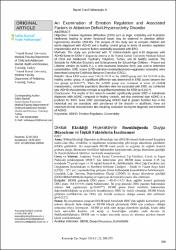| dc.contributor.author | Baykal, Saliha | |
| dc.contributor.author | Nalbantoğlu, Ayşin | |
| dc.date.accessioned | 2022-05-11T14:12:35Z | |
| dc.date.available | 2022-05-11T14:12:35Z | |
| dc.date.issued | 2019 | |
| dc.identifier.issn | 1309-3878 | |
| dc.identifier.uri | https://doi.org/10.18521/ktd.530900 | |
| dc.identifier.uri | https://hdl.handle.net/20.500.11776/5608 | |
| dc.description.abstract | Objective: Emotion regulation difficulties (ERD) such as anger, irritability and frustration intolerance leading to severe functional losses may be observed in attention deficit-hyperactivity disorder (ADHD). The purpose of this study was to compare children and adults diagnosed with ADHD and a healthy control group in terms of emotion regulation characteristics and to examine factors potentially associated with ERD. Methods: The study was performed with 72 children/adults aged 6-18 diagnosed with ADHD based on DSM-V diagnostic criteria at the Namik Kemal University Medical School of Child and Adolescent Psychiatry Polyclinic, Turkey, and 30 healthy controls. The Schedule for Affective Disorders and Schizophrenia for School-Age Children - Present and Lifetime Version (K-SADS-PL), a semi-structured interview form, was used to determine comorbidities. ERD scores (ERD=attention+anxiety/depression+aggression sub scales) were determined using the Childhood Behavior Checklist (CBCL). Results: Mean ERD scores were 189.45 +/- 19.33 in the ADHD group and 164.13 +/- 9.94 in the healthy control group. A significant difference was determined in ERD scores between the two groups (p<0.001**). When the ADHD group was evaluated in terms of clinical characteristics, comorbid psychiatric disorders were not associated with ERD, but combined type ADHD characteristics emerged as significant predictors for ERD (p=0.011*). Conclusions: The results of this research revealed significantly greater ERD in individuals diagnosed with ADHD compared to healthy controls, and that combined type ADHD is a predictor for ERD. Since ERD accompanying ADHD lead to greater function loss in the individual and are associated with persistence of the disorder in adulthood, these are important clinical characteristics also requiring evaluation during the diagnosis and treatment of ADHD. | en_US |
| dc.language.iso | eng | en_US |
| dc.publisher | Duzce Univ | en_US |
| dc.identifier.doi | 10.18521/ktd.530900 | |
| dc.rights | info:eu-repo/semantics/openAccess | en_US |
| dc.subject | ADHD | en_US |
| dc.subject | Emotion Regulation | en_US |
| dc.subject | Comorbidity | en_US |
| dc.subject | Deficit/Hyperactivity Disorder | en_US |
| dc.subject | Children | en_US |
| dc.subject | Lability | en_US |
| dc.subject | Dysregulation | en_US |
| dc.subject | Adhd | en_US |
| dc.title | An Examination of Emotion Regulation and Associated Factors in Attention Deficit-Hyperactivity Disorder | en_US |
| dc.type | article | en_US |
| dc.relation.ispartof | Konuralp Tip Dergisi | en_US |
| dc.department | Fakülteler, Tıp Fakültesi, Dahili Tıp Bilimleri Bölümü, Çocuk ve Ergen Ruh Sağlığı ve Hastalıkları Ana Bilim Dalı | en_US |
| dc.department | Fakülteler, Tıp Fakültesi, Dahili Tıp Bilimleri Bölümü, Çocuk Sağlığı ve Hastalıkları Ana Bilim Dalı | en_US |
| dc.identifier.volume | 11 | en_US |
| dc.identifier.issue | 2 | en_US |
| dc.identifier.startpage | 269 | en_US |
| dc.identifier.endpage | 273 | en_US |
| dc.institutionauthor | Baykal, Saliha | |
| dc.institutionauthor | Nalbantoğlu, Ayşin | |
| dc.relation.publicationcategory | Makale - Uluslararası Hakemli Dergi - Kurum Öğretim Elemanı | en_US |
| dc.identifier.wos | WOS:000487340900016 | en_US |



















